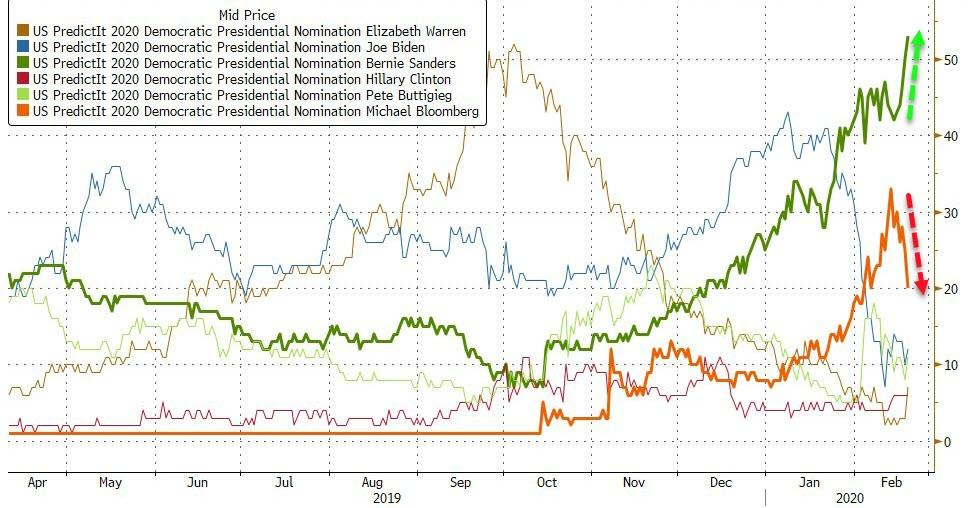Augur Weekly - Contested Convention Odds 🏟️
A Look at the Week in Political Betting, Augur News, and More

Election Betting Roundup

Over the past month, Bernie Sanders’ early primary strength has amassed him a commanding lead in Democratic Nomination markets. He’s currently trading in the mid-50s on PredictIt, up over 30c/share on second-place Bloomberg.
This is an interesting dynamic given an adjacent market: Will the Democrats have a brokered convention in 2020?
In the event of a contested convention, Bernie’s probability of winning would likely fall, as party insiders can tip the scales in favor of a more establishment nominee.
Despite betting markets having a relatively low amount of active shares—around $75k on PredictIt and $4k on Betfair—the market for whether there will be a contested convention is trading at 53c and 55c on each platform, respectively.
538’s model, to their credit, gives a contested convention better odds than any candidate receiving the 50% majority necessary to avoid it.

However, there’s a greater than 10% gap between the probability in 538’s model (‘No one’ implies a contested convention) and the odds on betting exchanges. What’s more, over the previous 3 months, the markets’ odds of a contested convention have been nearly double 538’s model’s odds.
If a contested convention ends up happening, the betting markets had a significant jump on 538’s models.
How it happens
The path to a contested convention starts with an unusually crowded primary field, with half a dozen candidates who have a legitimate chance at the nomination.
If Bernie does not earn a majority of pledged delegates (1,991 of 3,979) available to win the nomination on the first ballot at the July convention, any one of the remaining candidates could still have a shot at nabbing the party's nomination at its national convention, set for July 13-16 in Milwaukee, Wisconsin.

538’s model has Sanders pulling in 1,555 delegates, on average—short of the amount needed to avoid a convention. There, on a second ballot, 770 party leaders including DNC members and Democratic members of Congress; known as superdelegates; are able to vote for who they wish. This creates the possibility that the candidate who won the most pledged delegates would not win the nomination.
After Nevada (2/22) and South Carolina (2/29), 6% of delegates will have been allocated. On the following three primary dates; March 3, March 10, and March 17; 54% of delegates will be fought for. If a clear-cut winner has not emerged after March 17, none of the crowded cast of candidates are incentivized to abandon the contest.
These candidates would have little to lose by remaining in the contest, needing only enough money for about a month of campaigning to see the majority of delegates sorted out. Warren, Biden, and Buttigieg all raised over $20m in Q4 2019; Steyer and Bloomberg can fund their campaigns. It is exceedingly likely that at least this group sticks it out to the convention.

Coming soon in Q1 2020, Augur will be the only exchange for political betting with no limits, the best odds, and the lowest fees!
More on Augur
Augur v2: A Tour of the Prediction Protocol’s First Major Upgrade
The Ultimate Guide to Decentralized Prediction Markets
Announcing the Augur v1 Cutoff
The Forecast Foundation has no role in the operation of markets, trades or actions created or performed on the Augur protocol, nor does it have the ability to censor, restrict, control, modify, change, revoke, terminate or make any changes to markets created on the Augur protocol. The Forecast Foundation has no more control over the Augur protocol than anyone else using Ethereum.
Thus, we do not seek to advise others on how to use the protocol. We encourage those in the community who are well educated on Augur to pay it forward and share their ideas for best practices, tips, fixes, etc with the larger community via Twitter, Discord, Reddit, Github, and other community channels. For more information regarding the role of the Forecast Foundation, check out the FAQ.

